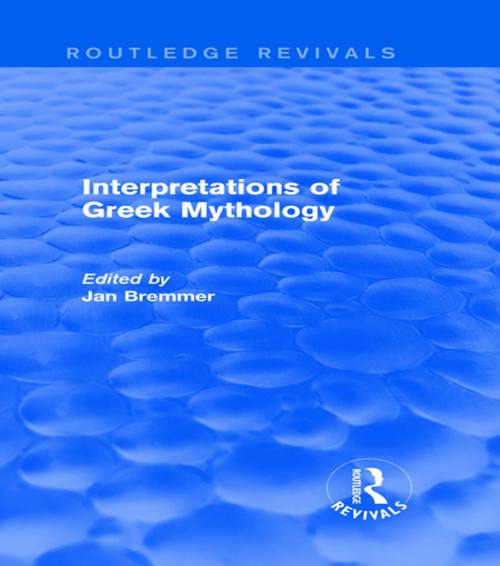Interpretations of Greek Mythology (Routledge Revivals)
Fiction & Literature, Literary Theory & Criticism, Ancient & Classical, Nonfiction, History, Ancient History, Greece| Author: | Jan N. Bremmer | ISBN: | 9781317800231 |
| Publisher: | Taylor and Francis | Publication: | March 18, 2014 |
| Imprint: | Routledge | Language: | English |
| Author: | Jan N. Bremmer |
| ISBN: | 9781317800231 |
| Publisher: | Taylor and Francis |
| Publication: | March 18, 2014 |
| Imprint: | Routledge |
| Language: | English |
Interpretations of Greek Mythology, first published in1987, builds on the innovative work of Walter Burkert and the ‘Paris school’ of Jean-Pierre Vernant, and represents a renewal of interpretation of Greek mythology. The contributors to this volume present a variety of approaches to the Greek myths, all of which eschew a monolithic or exclusively structuralist hermeneutic method. Specifically, the notion that mythology can simply be read as a primitive mode of narrative history is rejected, with emphasis instead being placed on the relationships between mythology and history, ritual and political genealogy.
The essays concentrate on some of the best known characters and themes – Oedipus, Orpheus, Narcissus – reflecting the complexity and fascination of the Greek imagination. The volume will long remain an indispensable tool for the study of Greek mythology, and it is of great interest to anyone interested in the development of Greek culture and civilisation and the nature of myth.
Interpretations of Greek Mythology, first published in1987, builds on the innovative work of Walter Burkert and the ‘Paris school’ of Jean-Pierre Vernant, and represents a renewal of interpretation of Greek mythology. The contributors to this volume present a variety of approaches to the Greek myths, all of which eschew a monolithic or exclusively structuralist hermeneutic method. Specifically, the notion that mythology can simply be read as a primitive mode of narrative history is rejected, with emphasis instead being placed on the relationships between mythology and history, ritual and political genealogy.
The essays concentrate on some of the best known characters and themes – Oedipus, Orpheus, Narcissus – reflecting the complexity and fascination of the Greek imagination. The volume will long remain an indispensable tool for the study of Greek mythology, and it is of great interest to anyone interested in the development of Greek culture and civilisation and the nature of myth.















